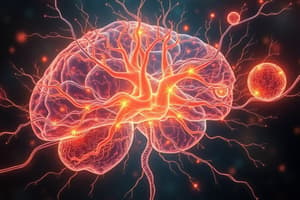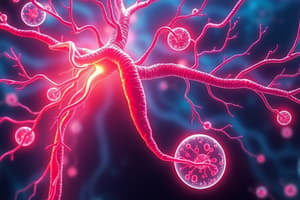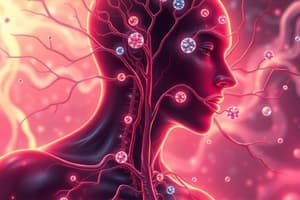Podcast
Questions and Answers
Sympathomimetics are drugs that block the effects of the sympathetic nervous system.
Sympathomimetics are drugs that block the effects of the sympathetic nervous system.
False (B)
Antiarrhythmics are primarily used to treat hypertension.
Antiarrhythmics are primarily used to treat hypertension.
False (B)
Bronchodilators are a type of medication used to treat respiratory infections like pneumonia.
Bronchodilators are a type of medication used to treat respiratory infections like pneumonia.
False (B)
H2 receptor antagonists and proton pump inhibitors are both effective in reducing acid secretion in the stomach.
H2 receptor antagonists and proton pump inhibitors are both effective in reducing acid secretion in the stomach.
Diuretics primarily target the cardiovascular system to lower blood pressure.
Diuretics primarily target the cardiovascular system to lower blood pressure.
Parasympatholytics are often used to slow down the heart rate.
Parasympatholytics are often used to slow down the heart rate.
Positive inotropic agents are used to decrease the force of heart contractions.
Positive inotropic agents are used to decrease the force of heart contractions.
Mucolytics are used to treat conditions like asthma by opening up the airways.
Mucolytics are used to treat conditions like asthma by opening up the airways.
Anxiolytics are a type of medication that addresses mood disorders.
Anxiolytics are a type of medication that addresses mood disorders.
Hormone replacement therapy is a treatment for thyroid hormone imbalance.
Hormone replacement therapy is a treatment for thyroid hormone imbalance.
Immunosuppressants and immunomodulators are only used to prevent organ rejection.
Immunosuppressants and immunomodulators are only used to prevent organ rejection.
Antibiotics are considered a type of antimicrobial.
Antibiotics are considered a type of antimicrobial.
All analgesics, regardless of type, address both chronic and acute pain.
All analgesics, regardless of type, address both chronic and acute pain.
Flashcards
Renin-angiotensin-aldosterone inhibitors
Renin-angiotensin-aldosterone inhibitors
Drugs that lower blood pressure and prevent fluid retention.
Antidepressants
Antidepressants
Medications that address symptoms of mood disorders by affecting neurotransmitters.
Immunosuppressants
Immunosuppressants
Drugs that inhibit the immune response, preventing organ rejection and treating autoimmune diseases.
Antidiabetic agents
Antidiabetic agents
Signup and view all the flashcards
Analgesics
Analgesics
Signup and view all the flashcards
Pharmacology II
Pharmacology II
Signup and view all the flashcards
Sympathomimetics
Sympathomimetics
Signup and view all the flashcards
Sympatholytics
Sympatholytics
Signup and view all the flashcards
Parasympathomimetics
Parasympathomimetics
Signup and view all the flashcards
Antihypertensives
Antihypertensives
Signup and view all the flashcards
Bronchodilators
Bronchodilators
Signup and view all the flashcards
Proton Pump Inhibitors
Proton Pump Inhibitors
Signup and view all the flashcards
Diuretics
Diuretics
Signup and view all the flashcards
Study Notes
Introduction to Pharmacology II
- Pharmacology II builds upon the foundational concepts of introductory pharmacology.
- It delves into more complex drug mechanisms, targeting specific therapeutic areas and physiological systems.
- This includes detailed analysis of specific drug classes and their use in clinical settings.
Autonomic Nervous System Pharmacology
- Drugs affecting the autonomic nervous system interact with both the sympathetic and parasympathetic branches.
- Sympathomimetics mimic the effects of sympathetic stimulation, increasing heart rate, blood pressure, and metabolic rate.
- Sympatholytics block sympathetic activity, often used to lower blood pressure or decrease anxiety.
- Parasympathomimetics mimic the effects of the parasympathetic system, slowing the heart rate and promoting digestion.
- Parasympatholytics block parasympathetic activity, used in treating certain eye conditions or urinary issues.
Cardiovascular Pharmacology
- Drugs targeting the cardiovascular system are crucial for treating conditions like hypertension, arrhythmias, and heart failure.
- Antihypertensives lower blood pressure through various mechanisms, including diuretics, beta-blockers, ACE inhibitors, and calcium channel blockers.
- Antiarrhythmics regulate abnormal heart rhythms, potentially acting on sodium, potassium, or calcium channels.
- Positive inotropic agents increase the force of heart contractions, useful in treating heart failure.
Respiratory Pharmacology
- This area focuses on addressing respiratory issues, including asthma, bronchitis, and emphysema.
- Bronchodilators open airways in the lungs, alleviating bronchospasm.
- Mucolytics thin and loosen respiratory secretions, easing breathing.
- Anti-inflammatory agents manage inflammation of the airways, frequently used in asthma treatment.
Gastrointestinal Pharmacology
- Drugs acting on the GI tract address various issues like ulcers, nausea, and motility problems.
- Antacids neutralize stomach acid, used in treating heartburn and indigestion.
- H2 receptor antagonists decrease acid secretion, aiding in treating peptic ulcers.
- Proton pump inhibitors effectively suppress acid secretion, commonly used to prevent ulcers.
Renal Pharmacology
- Renal pharmacology covers drugs influencing kidney function and blood pressure regulation.
- Diuretics increase urine output, aiding in treating hypertension and edema.
- Renin-angiotensin-aldosterone system inhibitors lower blood pressure and prevent fluid retention.
- Drugs modulating renal function impact kidney-related issues.
Central Nervous System Pharmacology
- Drugs affecting the CNS target a wide range of functions and disorders.
- Antidepressants address various symptoms linked to mood disorders, affecting neurotransmitter systems.
- Anxiolytics alleviate anxiety and promote relaxation.
- Antipsychotics treat psychosis and certain mental disorders.
- Analgesics and anesthetics control pain, whether acute or chronic.
- Stimulants enhance alertness and cognitive function.
- Sedatives induce relaxation and sleep.
Endocrine Pharmacology
- Drugs affecting endocrine function target hormones and their associated disorders.
- Hormone replacement therapy restores hormone levels in deficiency states.
- Antidiabetic agents address problems in blood glucose regulation.
- Thyroid medications treat conditions related to thyroid hormone imbalance.
Immunosuppressants and Immunomodulators
- Immunosuppressants and immunomodulators affect the immune system.
- They are used in preventing organ rejection after transplantation.
- They also treat autoimmune diseases.
Miscellaneous Topics
- Special drug categories include:
- Antimicrobials (Antibiotics, antifungals, antivirals)
- Chemotherapeutics for treating cancer
- Local anesthetics
- Analgesics (various types).
- This category encompasses an extensive array of drugs with diverse mechanisms of action.
Conclusion
- This section provides an overview of key areas within Pharmacology II.
- It highlights major therapeutic areas and drug classes explored in more detail in a comprehensive course.
Studying That Suits You
Use AI to generate personalized quizzes and flashcards to suit your learning preferences.




